GREEN DASH
Cheaper down the road — total cost of e-buses beats diesel in the long run in South Africa: study
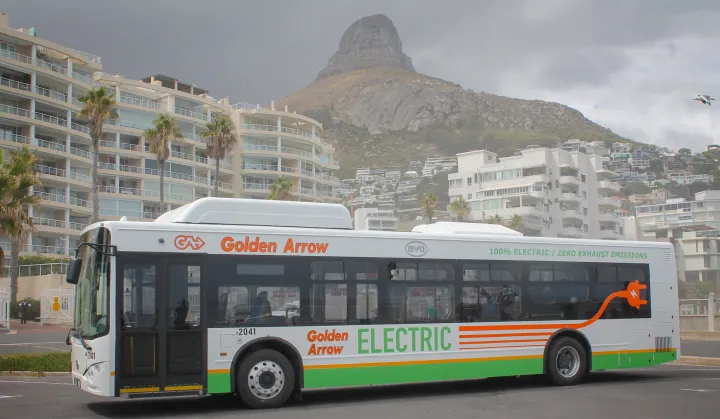
A new report finds that a transition from diesel to battery-powered electric buses in South Africa’s main cities can be justified purely on a financial basis, in most circumstances.️
While the capital cost of an electric bus (e-bus) is currently a lot steeper than that of a diesel bus – owing in part to South Africa’s lagging electric vehicle manufacturing scene – a recent study found that because operating costs are much lower over an e-bus’s lifetime, the total cost of owning e-buses is lower than that of diesel buses.
These findings were published by C40 Cities Climate Leadership Group in a recent report, Accelerating a Market Transition in South Africa: Insights into the Bus Industry and Emerging Electric Bus Models, which justified five South African cities moving to battery-powered e-buses purely on a financial basis.
C40 Cities is a global network of nearly 100 mayors from cities across the world that have committed to confront the climate crisis and accelerate a shift.
This report focuses on the five South African cities that are members of C40 – Johannesburg, Ekurhuleni, Tshwane, Cape Town and eThekwini.
Total cost is lower
Currently in South Africa, diesel buses have the most competitive capital costs compared with other bus technologies – nearly half the price of buying an e-bus today.
A standard 12m commuter (Euro VI) diesel bus costs between R4.5-million and R5-million, whereas a standard 12m commuter battery electric bus costs about R9-million.
A significant portion of the steep cost of an e-bus comes from the battery (about 30% of total bus cost) and the need for battery replacement after eight years – although the report notes that battery prices have already fallen by 79% since 2010 and are expected to continue declining.
E-buses also have a high infrastructure cost (supply of electricity and charging), and higher import taxes – because there is no formal e-bus manufacturing industry in South Africa yet, meaning e-buses need to be imported, while diesel buses are built in South Africa.
Which is why the local manufacture of e-buses is so pivotal to reduce the purchase price over time. For example, Stellenbosch University is doing a retrofit project with Golden Arrow Bus Services, to kick-start and develop the electric vehicle manufacturing industry and skills in South Africa.
Read more in Daily Maverick: SA’s first electric taxi is ‘a stepping stone’ for lagging EV industry
But, the study’s modelling, which analysed various factors, including life cycle considerations and operational costs, found that while e-buses are often more expensive up-front, they can become more cost effective over their lifetime, especially if they remain in service for an extended period.
To achieve a longer lifespan, the study recommends that cities and operators buy buses that are well suited for the local operating environment and conditions, and that they are built to have a longer useful life (at least 12 years, but ideally to 16 or 18.)
The study found that over a longer operational period, the total operating costs, including charging and other infrastructure costs, between a Euro VI diesel and electric bus were essentially the same: At R37.56 per kilometre and R37.62 per km respectively.
That is, up until 13 years of life when the e-bus becomes more cost effective.
Most of the total cost of a diesel bus is driven by its higher operating costs for fuel and maintenance. For e-buses, the total cost is driven by the initial capital, replacement battery, and cost of charging infrastructure.
But, the report’s modelling found that when considering the cumulative total cost of ownership for a bus and infrastructure costs over 16 years, the cost of an e-bus gradually decreases compared with that of a diesel bus.
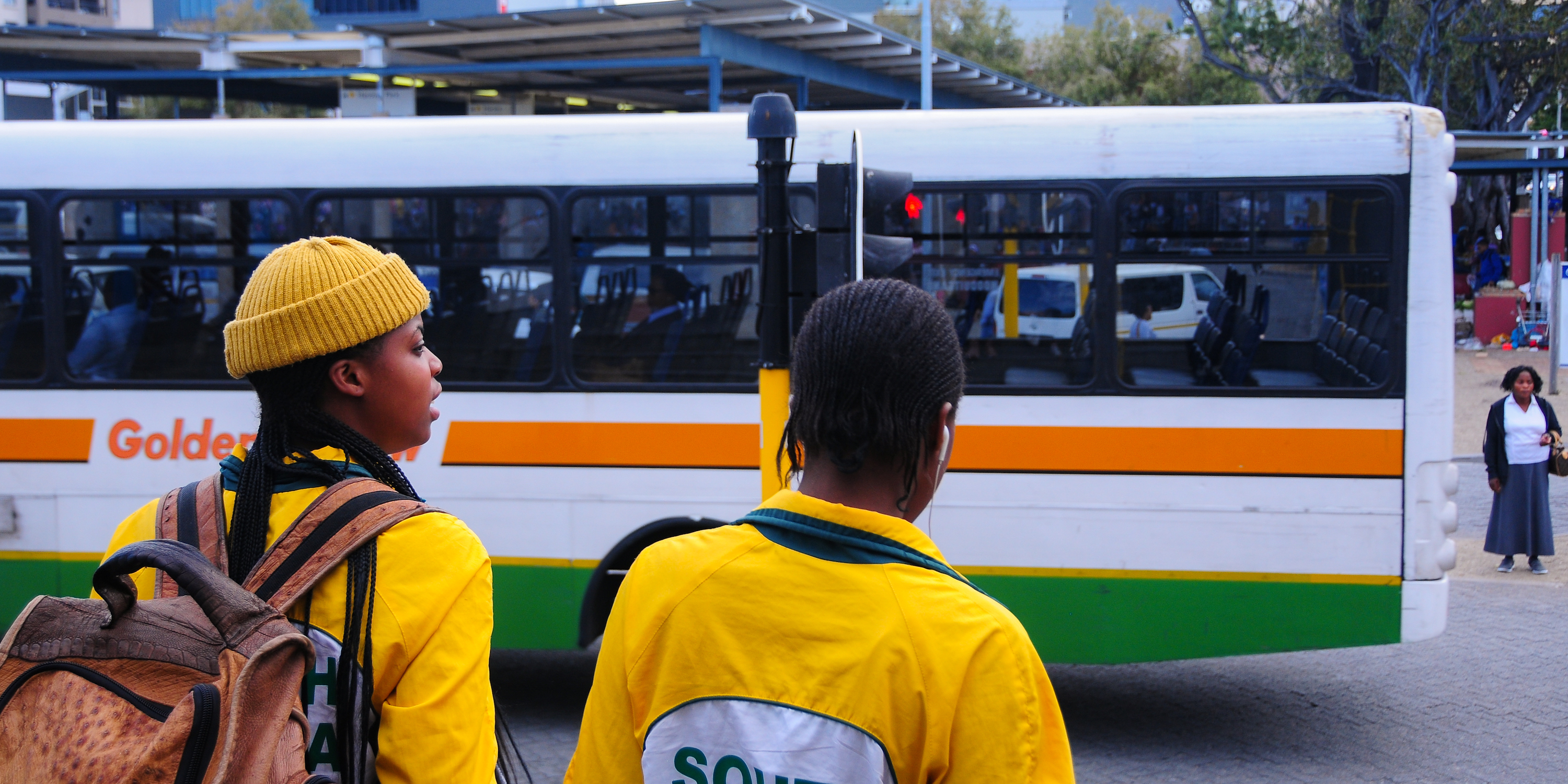
Students wait for a Golden Arrow bus to pass before crossing the road to Claremont Station in Cape Town. (Photo: Julia Evans)
This is because the high initial costs associated with supplying the electrical charging infrastructure for an e-bus becomes balanced by lower operational costs, with an e-bus becoming more cost-effective than a diesel bus from year 13 of its life.
This makes sense when considering that the fuel cost of a diesel bus is significantly higher than that of an e-bus, with the analysis showing the fuel price of R21.50 per litre and an electricity price of R0.99 per kWh. Plus, a diesel bus is about 55% more expensive to maintain compared with an e-bus.
The study found that if infrastructure costs for charging and fuel are excluded for e-buses (if a municipality covers the cost of enhanced electricity supply required for charging for their city buses, and related costs), the higher capital cost of e-buses are recouped by year nine.
The Golden Arrow electric bus pilot
Daily Maverick reported last November that the Golden Arrow Bus Service (GABS) planned to include at least 60 e-buses in its fleet renewal programme, aiming to be added to Cape Town’s roads by December 2025.
Read more in Daily Maverick: Golden Arrow set to become SA’s first public bus service with an electric vehicle fleet
GABS began its pilot project in 2021, and has since conducted more than 100,000km of testing on the roads with four e-buses.
Gideon Neethling, the chief engineer at Golden Arrow, told Daily Maverick at the time that the service buys five new buses per month. “From now, they’ll be EVs, not diesel buses, as part of our fleet renewal programme.”
From this project, the bus service confirmed that:
- E-bus battery range is 300km on a full charge;
- It takes two to three hours to fully charge these e-buses;
- Energy efficiency was found to be 1.10 kWh per km for a 65-seater e-bus;
- Energy cost savings of 70% was achieved by the 65-seater bus; and
- Maintenance impact showed a 50% savings in spare parts, 30% savings in labour, and 80% savings in oils and lubricants for the e-buses.
GABS projected a saving of about R660,000 in fuel costs per bus per year by switching from a diesel bus to an e-bus (using May 2023 prices).
This example confirmed the study’s modelling that despite the higher purchase cost of an e-bus, which is roughly double that of a diesel bus (including import duties and ad valorem taxes), the bus fleet operator would still benefit from the fuel savings accrued.
Daily Maverick reported that the bus service envisages replacing its existing fleet of 1,100 with 60 e-buses every year, starting from 2024, until its full fleet of diesel buses has been replaced.
This represents an estimated annual investment of about R360-million, but GABS’s conclusion is that this would allow the e-bus to pay for itself over eight to 12 years.
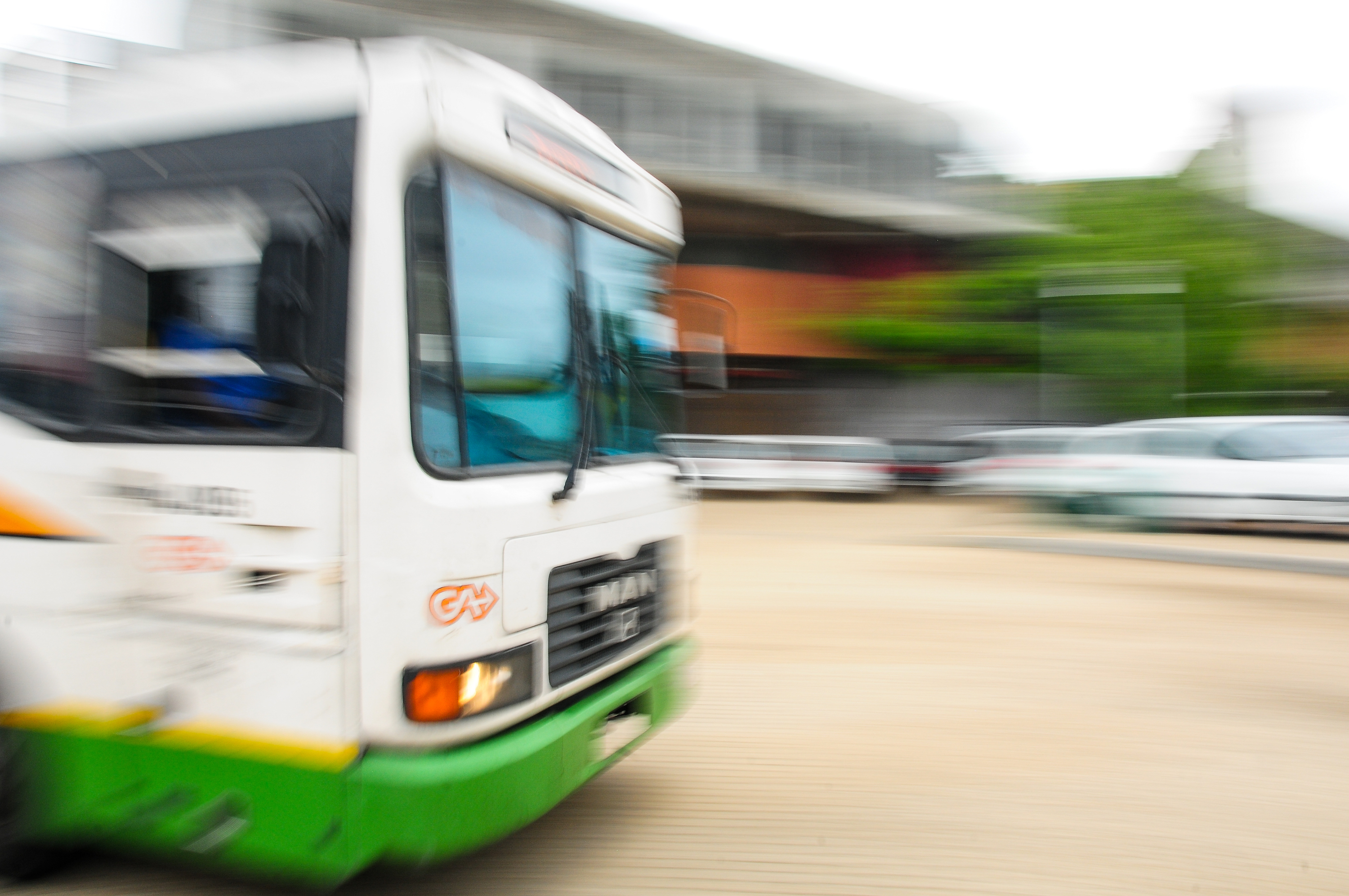
An ICEV Golden Arrow bus departing from Claremont Station in Cape Town. (Photo: Julia Evans)
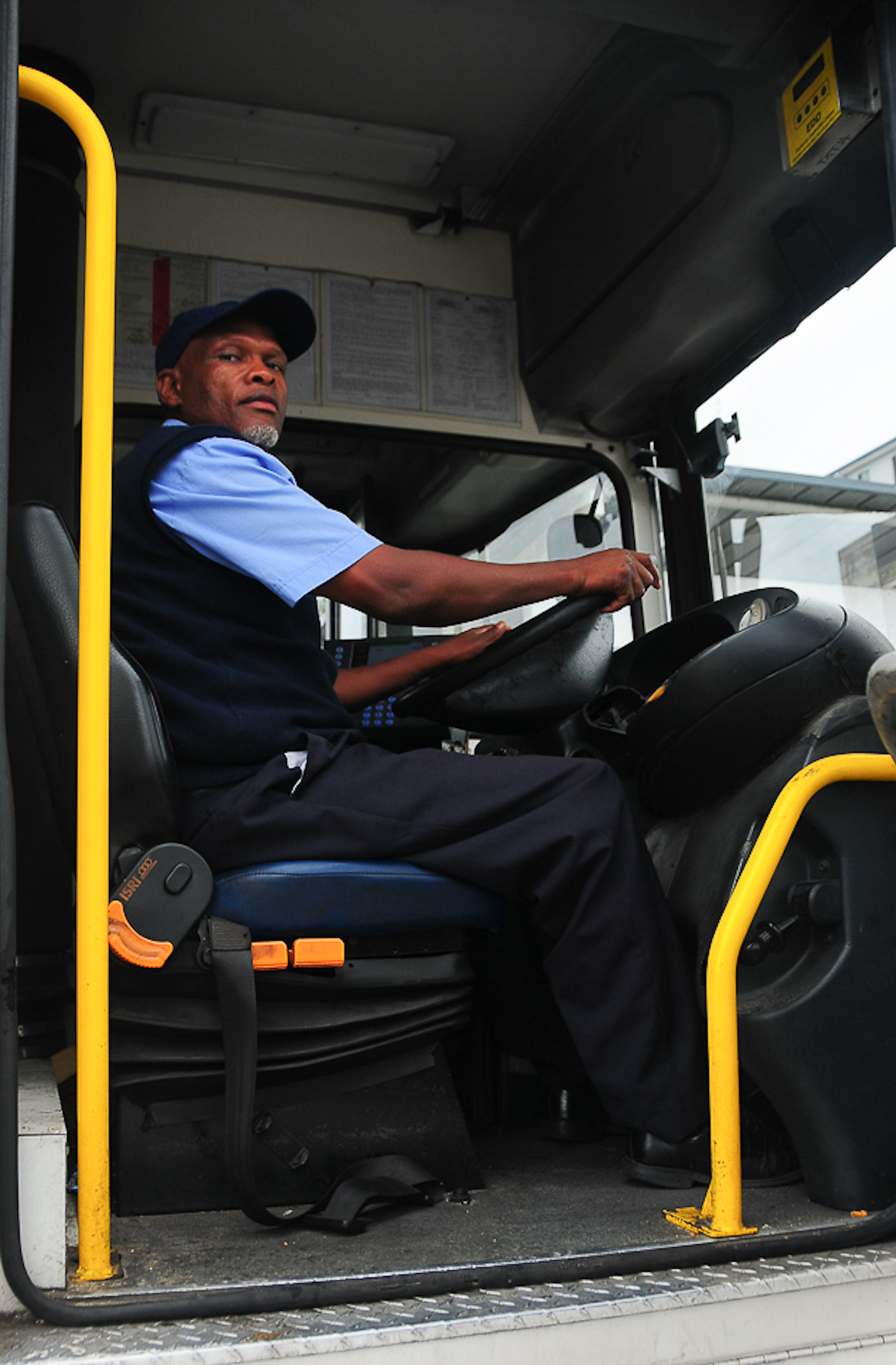
A Golden Arrow bus driver at Claremont Station before his trip. (Photo: Julia Evans)
What the government needs to do to accelerate the shift
To address the challenge of the steep upfront capital costs of e-buses and charging infrastructure, the report suggests securing lower interest rates, particularly through climate mitigation mechanisms.
This report recommends that the South African government drive its newly released Electric Vehicles White Paper (November 2023) action plan for manufacturing EVs, with a focus on battery electric buses.
The C40 report also suggests that the government and other stakeholders can help to accelerate the shift by lowering financing costs, adjusting import taxes, investing in electricity infrastructure to help facilitate charging, and developing business models that are better aligned to the demands of the new technology.
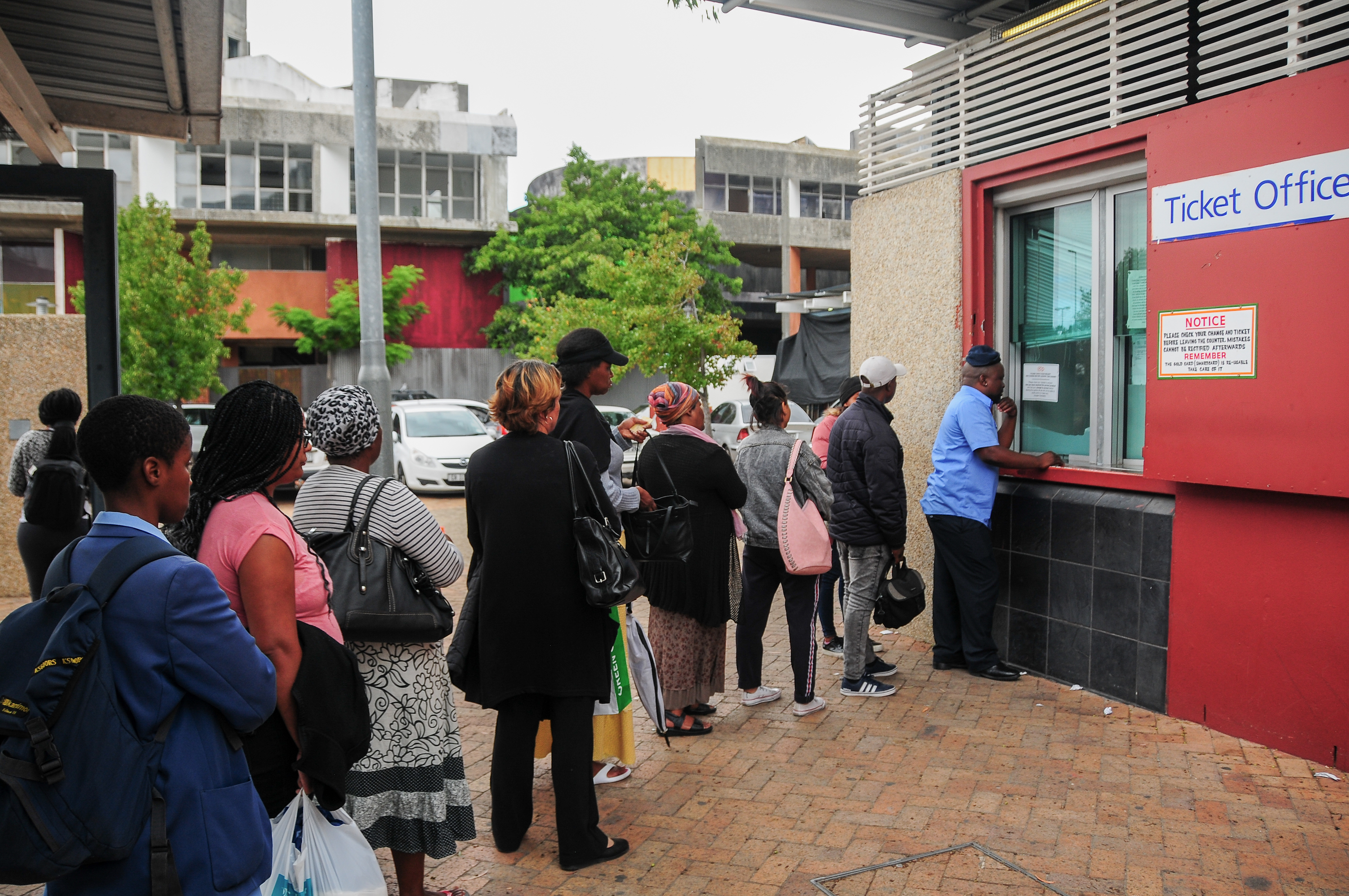
Bus commuters line up to buy a ticket home during peak hour at Claremont Station in Cape Town. (Photo: Julia Evans)
The lack of policy incentives from the government has been a big reason for South Africa losing the EV race and is one of the reasons this white paper (which was meant to come out in 2021) is such a big deal.
Read more in Daily Maverick: Rapid shift to renewable energy vital for electric vehicle transition, says Minister Patel
Trade, Industry and Competition Minister Ebrahim Patel previously told Daily Maverick that they expected the price differential to come down in the next eight or so years, adding: “It may be quicker. Technology always surprises everybody.” DM



















 Become an Insider
Become an Insider
This promotion of e-buses is fundamentally flawed & is questionable.
1. The current cost of electricity is R1.84 per kwh, almost double to what’s in the article.
2. The lifespan of the bus is hypothetically expanded to make e-busses efficient. A true reflection is to make comparisons bases on current lifespan of vehicles.
3. The interest of approx R4m which if the difference in cost is not factored into the cost of running the vehicle over a agreed lifespan.
4. Big operators are used in this analysis. They get govt subsidies which are funded by the taxpayer & other grants which increases their buying power & reduces their initial investments.
A proper comparison will provide side by side data reflecting the cost of operating the 2 vehicles for a set period.
I’ve not read the report but I do wonder about the assumptions re the life span of buses. The taxi industry won’t take kindly to competition – look what they did to trains in CT. Then there’s also general unrest and so on where busses get torched. This is not to say that there aren’t other reasons to consider e-buses such and environmental and health, but the cost motivation for buses doesn’t seem realistic.
Golden Arrow is a private company. The subsidy they receive is not influenced by bus technology. Therefore the decision to shift to electric buses is purely a commercial one. I.e. they will generate greater profit by doing so.
Awesome news!